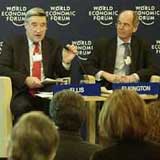

John (right) at WEF 2003,
with Vernon Ellis of Accenture
www
World Economic Forum
World Social Forum
Environics
Gallup International


John (right) at WEF 2003,
with Vernon Ellis of Accenture
www
World Economic Forum
World Social Forum
Environics
Gallup International
Several years back, on the top floor of Ford's World Headquarters building outside Detroit, I found myself in energetic disagreement with a leading corporate governance expert. He had taken issue with my view that the field of governance was about to overlap with wider societal concerns, as expressed by the corporate social responsibility (CSR) and sustainable development (SD) agendas. He argued that this would - indeed should - not happen. At this year's World Economic Forum's Davos meeting I wished he had been along for the ride.
For, like it or not, the worlds of CSR and SD are colliding with the worlds of corporate and global governance. And nowhere are the resulting seismic shocks more dramatically spotlighted than in the annual sparring between the World Economic Forum (WEF) summit in Switzerland, and the World Social Forum (WSF) counterblast in Porto Alegre, Brazil.
This year SustainAbility was at both events. We had ringside seats at what is developing into a 'Heavyweight Championship for the World'. The 33-year-old World Economic Forum is the defending champion, while the 3-year-old World Social Forum is the challenger. The sheer scale of the WSF event, which this year swelled to 120,000 participants, suggests that the anti-globalization movement is mutating in ways which have profound implications for business leaders.
Interestingly, the mood in Davos has swung violently in recent years. WEF events through the 1990s were notable for their high-octane support for globalization and the 'New Economy'. In the wake of 9/11, however, last year's 'Davos in New York' summit saw the global élite struggling to understand a new agenda fuelled by concerns about terrorism, militant Islam, various forms of anti-globalization, recession and the collapse of US energy giant Enron.
Whether or not the assembled CEOs liked it, the big issue in 2002 was the growing frustration and anger born of poverty - and the urgent need to bridge the yawning wealth gap. Citing the shocking fact that a billion people in the developing world live on less than a dollar a day, Cisco Systems CEO John Chambers warned that "we're leaving a lot of people behind."
This year the mood swings were largely fuelled by concerns about the impending invasion of Iraq. But, whether a given session focused on Iraq, HIV/AIDS or competitivity, we kept returning to 2003's theme - 'Building Trust'. WEF founder Klaus Schwab stressed that "never before in the 33 years of the Forum's history has the situation in the world been as fragile, as complex and dangerous as this year." Trust, he said, "is the foundation of all personal relationships. It is the foundation of all business. It is the foundation of all international relations. In our increasingly interconnected world, trust is the rock on which we all depend. Without trust, there can be no respect, no security, and no spirit of partnership or cooperation."
Unhappily, levels of trust are declining worldwide, as confirmed by a survey by Environics and Gallup International. Polling 36,000 citizens in 47 countries on six continents, this is billed as representative of 1.4 billion people - and the results show that trust is lowest in national legislative bodies and in large companies.
So where is WEF headed? On the final morning, the participants agreed three urgent priorities. First, there must be a strong focus on values. Values, said Boeing Chairman and CEO Philip Condit, are "absolutely crucial within a company, within an economy, for building trust".
Second, we need to focus on volatility and risk. Business now faces an unparalleled convergence of political, social and economic risks. In the past, companies tended to get into trouble because they were "in the wrong place at the wrong time". Today, the risks are systemic - and the solutions, too, must be systemic.
The third WEF priority was interesting. Sustainable development
was seen as central - and the consensus was that business has an increasingly
critical role to play in making it happen. So any company directors thinking
that the heat is off because of the recession or America's collision with
the "axis of evil" would be well advised to visit the WEF and WSF
web-sites and consider how long these issues can be kept out of the boardroom.